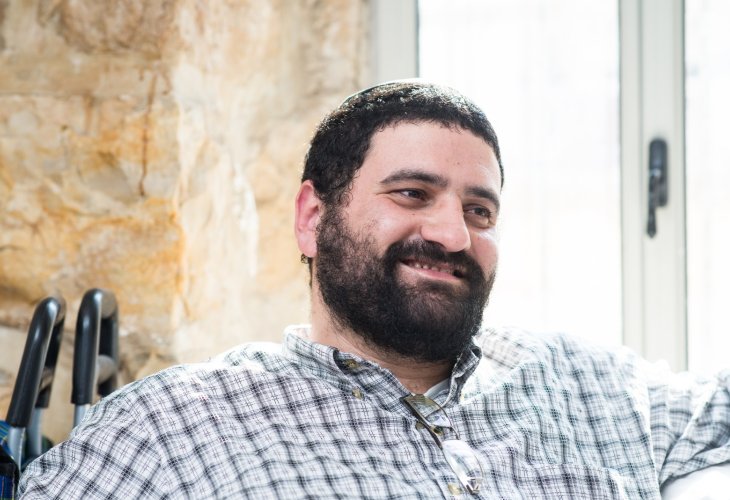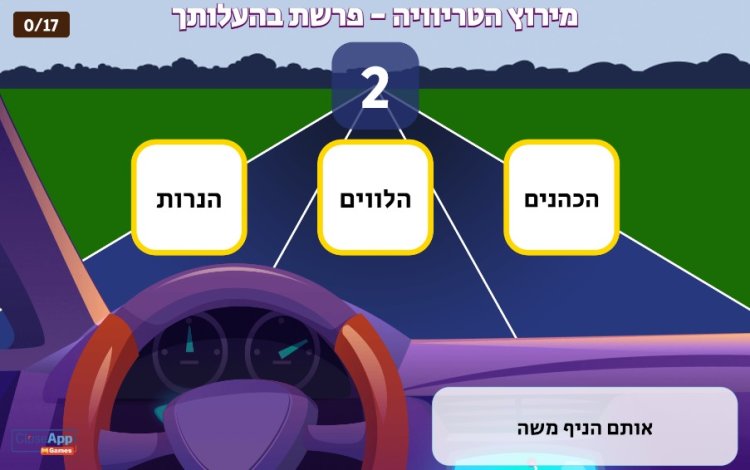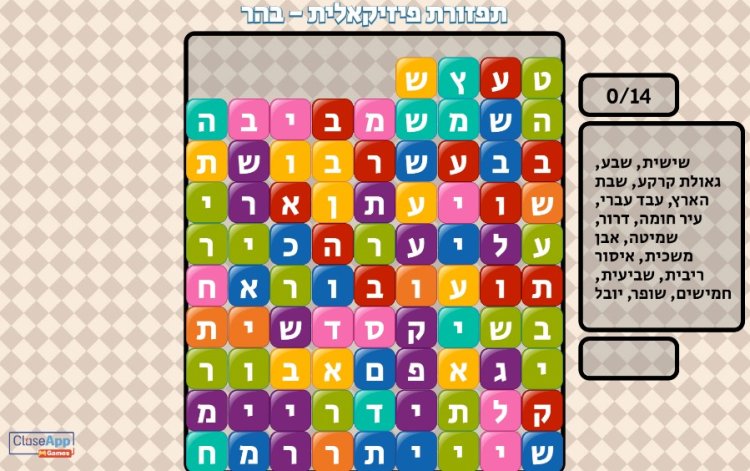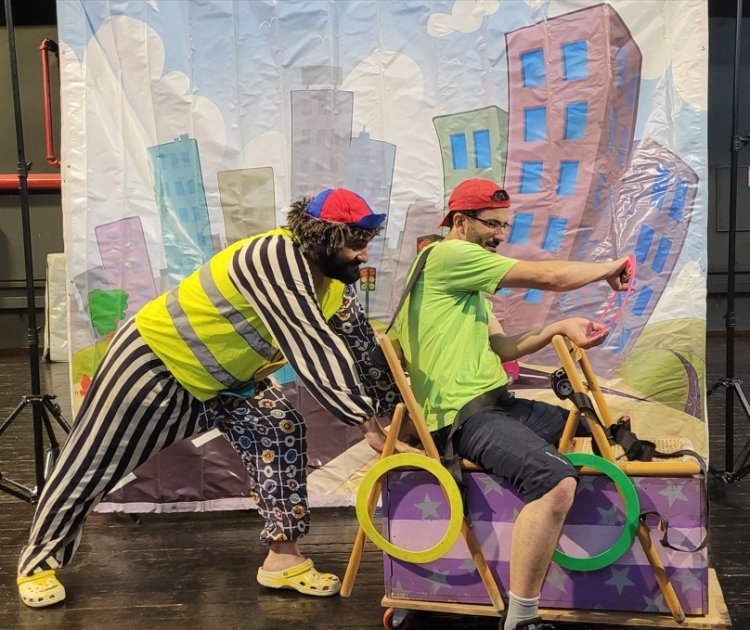The Juggler Reveals: "How I Introduced Jewish Games to Computers"
Familiar with the famous clicker games, the 'Shabbat Game' on the web, and the games on heritage and tourism sites? Meet Ami Hania, the man who developed thousands of computer games, sharing what led him to this unique field, along with his other exciting occupation: a juggler and playback actor.
 Ami Hania (Photo: Avitz)
Ami Hania (Photo: Avitz)"Sometimes I feel like a child who's just happened to be in an adult's body," says Ami Hania, the man behind the development of thrilling computer games known to almost all of us.
He lives in the Tapuach village, married with six children, but in his professional work, he interacts with kids all over the country nonstop. "It starts with me being a juggler and performing in the 'Mofash' theater with fire and juggling shows across the country. I'm also part of a playback performance with other friends, and I have the software house CloseApp through which I disseminate computer games that have been played over a million and a half times in the country so far."
 Photo: Yaakov Nahumi
Photo: Yaakov Nahumi
A Development Moment
"Since I was young, I engaged in computer programming, even though I never formally studied it," says Ami. "After leaving the army, I specialized in this field but did it mainly for fun and enjoyment. The games I developed were uploaded online for free, and I quickly discovered there was a big demand since about 20 years ago, there were hardly any games online. But only after I started receiving requests from different sites asking for specific games did I realize that this occupation could go much further, developing tailored games to meet different needs."
 Screenshot of the Shabbat Game
Screenshot of the Shabbat GameWhat do you mean?
"Commercial companies approached me to develop games related to their products. There were schools that wanted computer quizzes on specific topics or parents who were celebrating a birthday for their child and needed a suitable game, and there was also a site preparing children for a Bar Mitzvah that asked me to develop a game for learning the cantillation marks."
Regarding the latter request, Ami mentions he developed an exciting game where children have to identify the cantillation, and when they answer correctly, candies are thrown at the Bar Mitzvah boy.
"I threw myself into the work with full vigor," he says. "In those years, I developed games for the largest companies in the country, including educational games for learning various subjects. I would sometimes develop dozens of games in a week, and there was a time when every new product launch was accompanied by a computer game I developed, enabling people to play and win prizes."
 Screenshot of the Shabbat Game
Screenshot of the Shabbat GameOver time, Ami discovered an interesting fact: most of his clients usually requested the same games, only with small changes in characters or structure. "As a result, I created a tool that allows the games to be replicated and customized. Today, any client who comes to me can create a game using special tools I provide, customizing it exactly to their needs with minimal effort."
But that wasn't the end of Ami's creativity, as about five years ago, he also started a new project under the title 'The Shabbat Game.' "It all started because of my sister, who works as a teacher," he says. "She complained to me that while there are diverse games online in math, science, English, and more, there are no games in the religious domain, and when she wants to give her students the ability to review the material interactively, it's not really possible."
"At that moment, I understood I wanted to enter this field, so I began developing weekly games for each Parashah. By the end of that year, I realized I had developed 100 games, but with so many more ideas, I decided to continue. Since then, I've developed nearly a new game every week, totaling over 430 games."
Want to play the Shabbat game too? Click here and enjoy hundreds of invested and cool games at the Children's World site.
And where do all the ideas come from?
"Sometimes I think of an idea for a game and then look for a context in the Parashah, and sometimes it's the opposite - there's an element in the Parashah that sparks the idea. Naturally, the Book of Genesis provides the most ideas because of its vivid stories, while the Book of Leviticus is the most challenging. But I'm not deterred by the lack of constant ideas, as it precisely challenges me. I also involve my children in the decision-making, and not infrequently, they throw marvelous ideas into the air, which I later use."
Ami gives impressive numbers: "Each week, several thousand children play the Shabbat game, and to date, more than a million and a half have played them. It provides immense satisfaction, not just as a profession but in a significant field with added value. It's important to me that through these games, we also convey Jewish values and concepts. I'm aware there are many schools, including some from the secular sector, that direct their students to these games. I'm happy about it, but it's also very demanding."
 Screenshot of the Shabbat Game
Screenshot of the Shabbat Game
Play and Learn
In addition to the weekly Parashah games, Ami has established in recent years a software house for creating games called CloseApp, through which he, together with a team of workers, develops a variety of games for clients—from clicker games for quizzes and activities, to educational games such as driver's theory studies, to games for exhibitions in museums or heritage centers, and of course, there are games for adults. "Each game is built to exactly match the players' needs," explains Ami. "That's the beauty here—you can create games on a wide range of levels."
Do you yourself play the games you develop?
"That's a tricky question," he smiles. "The truth is, I usually perform an initial check to ensure everything is functioning as required, and then I don't touch it. I return to the game only after a while to verify it's active and functioning."
There are children (and adults too) who enjoy games less because they find it stressful...
"I know this exists, and I usually hear about it from people who leave clicker games frustrated about not winning. It's natural since we all love to win, but the disappointment isn't justified. A game is a wonderful thing, challenging and enjoyable. Victory isn't a precondition for enjoyment, but just a bonus. In any case, I make sure not to include gambling or monetary prizes in my games, as these remain totally out of bounds."
What do you consider the most successful game you've ever built?
Here too, it turns out Ami doesn't need to guess as he has a system that analyzes the data. "The younger ages always connect more to colorful games with changing pictures, while older ages connect to games that pose a challenge both in the content of the question and in execution. I developed a game where you have to bounce a ball upwards until it falls on the correct answer. The challenge is to calculate the angle correctly so the ball falls exactly in the right place. I saw people played this game twice as long as usual—it must have been quite challenging for them."
While Ami can see thousands of children play his games weekly, he usually only receives one thank-you per 10,000 players (yes, his system also has these metrics). He has a showbiz side to him, where he performs and receives instant applause. "I feel like it creates a real complement," he explains, "because to successfully tailor my content for children, I have to feel them, so I meet them from afar and also up close."
 Credit: Mofash Theater
Credit: Mofash TheaterDo you feel there's something common to all the areas you work in?
"Certainly, they're all directly related to gaming. They're bound to a sort of unreal world we've invented and immersed ourselves in. This is an imaginary space where we're daring to do things that aren't part of our daily reality, and that's exactly what characterizes all my occupations. It's also what sometimes makes me want to return to being a child and get absorbed into this magical world."
Want to play the Shabbat game too? Click here and enjoy hundreds of invested and cool games at the Children's World site.

